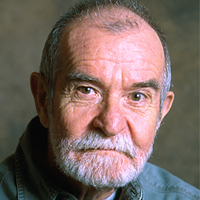Symbolism in "Master Harold"... and the Boys
The title of this play Master Harold and the boys is symbolic. The title suggests a hierarchy. This play has been written in the South African context. The setting of the play has been South Africa. Master Harold, a seventeen years old boy, is a white. But the boys who are matures men of the forties are black and have been working in the restaurant of Hally.

Athol Fugard (11 June 1932)
The boys, though grownups are called boys only on the ground of their dark complexion. But it is strange to hear a seventeen year old boy as Master Harold. The names of the boys are, respectively, Sam and Willie. They are waiters in the restaurant. The title symbolizes the racial discrimination of South Africa. South Africa was the country where the apartheid law was creating two states within a nation, state of blacks and state of whites in a nation. Racism was creating a boundary between two states. The play examines the effects of apartheid system, it is about love and hate relationship.
Kite Flying: Kite is a source of hope and fraternity. It signifies freedom, desire and aspiration. It symbolizes the consciousness of two characters Hally and Sam. It stands for their desire to transcend all the racial barriers. They want to develop free relationship. Kite flying is a symbol which stands for the idea of blacks and whites working together. It signifies hope in time to come.
Sam, a black has been helping the white boy Hally as a teacher and a moral guide. They have been living as friends despite the gap that exists between them as people of two races. Hally also feels happy and comfortable in his company. Fugard throughout the play emphasizes harmony and an end to racial thinking. He makes Sam work together with Hally. They work on the kite together. It is designed to advocate the joint efforts of Blacks and Whites. Hally forgets other things and feels happy during the period of kite flying. When they fly the kite it goes up high in the sky. They raised their heads to look at the flying kite. It is a symbol of hope for an America where both blacks and whites will be able to hold their heads high with dignity and self-respect. Thus, kite flying is used as a key symbol to urge Americans to end racism and live in co-existence and harmony with blacks and whites as the equal members of the same society.
The raining stands for the barrier for their free will. Hally finds himself in a confusing situation. The world of experience is full with racial consciousness, but the influence of black is also formative. Hally's character is fragmented into white culture and black friends. His life is scattered. Hally wants to educate black, but his speech reflects the superiority of white. He says "What a hell does a black man know about flying a kite." He has a preconception that the God wanted white to rule over the black. But he desires freedom. The doubt of white supremacy in his mind stands for life. He talks of being an atheist, scientist. Hally says that it is not possible to fly a kite in raining (during rain). Rainy day is depression and kite is an imagination. Kite stands for emancipation of soul and there is a need for kite in this confusing human relationship.
The dance has anthropological significance. Dance is the symbol for the beginning of culture and society. Play begins with a dance and ends with the dance. Dance uses no speech, but gestures. Willie is going to participate in a dance competition, so Sam is teaching him to dance. There are couples in that competition and Willie is going to participate with his girlfriend. But because of the misunderstanding between girlfriend and boyfriend, beloved doesn’t come to give company to her partner for the dance. Africans believe natural dance; so they dance naturally. The dance is an attempt to create harmony. We can see the harmonious movement and music flowing in the dance.
The only bench that reads "whites only" stands for the apartheid, division, hatred and racism. When Hally is angry because of his father, he could not bear the insult and humiliation caused by his father’s degradation, he sits on the bench and orders Sam to call him a Master. In extreme anger to make him feel superior, he even does not hesitate to spit in the face of Sam. Since then, their friendship ends and a relationship of master and slave starts. The bench symbolizes the division and the hierarchy.
